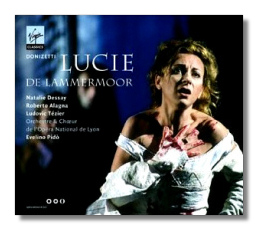
The Internet's Premier Classical Music Source
Related Links
- Donizetti Reviews
- Latest Reviews
- More Reviews
-
By Composer
-
Collections
DVD & Blu-ray
Books
Concert Reviews
Articles/Interviews
Software
Audio
Search Amazon
Recommended Links
Site News
 CD Review
CD Review
Gaetano Donizetti

Lucie de Lammermoor
- Natalie Dessay (Lucie)
- Roberto Alagna (Edgard)
- Ludovic Tézier (Henri)
- Marc Laho (Arthur)
- Nicolas Cavallier (Raymond)
- Yves Saelens (Gilbert)
Orchestra & Chorus of the National Opera of Lyon/Evelino Pidò
Virgin Classics 545528-2 DDD 2CDs: 77:25, 49:31
Here's a curiosity. La Favorita and La Favorite coexisted throughout the past century, and before Joan Sutherland and Luciano Pavarotti popularized La Fille du régiment in the 1960s, most opera fans probably knew it as La Figlia del Reggimento. Many of Donizetti's operas have coexisted in both French and Italian versions, a reflection of the fact that Italy and Paris were the dominant hubs of operatic activity in the 1800s, and that their citizens usually expected operas to be given in the vernacular. Lucia di Lammermoor debuted in Naples in 1835; when the opera premièred in Paris four years later, it had become Lucie de Lammermoor.
This required more than a translation of the Italian text into French. Rhythms needed to be changed to fit the French words. There were more drastic alterations, too. Lucia's maid Alisa disappeared in Paris. He was replaced with the servant Gilbert, who, as Henri's (Enrico's) henchman, spies on Lucie and Edgard (Edgardo's) love duet in Act One and tattles to Henri. Thus, Lucie is isolated and made a victim of male ambition almost from the opera's outset. "Regnava nel silenzio" is replaced with an aria that is far less successful in establishing Lucie's fragile emotional state. Raymond (Raimondo) has nothing to sing until the Act Two sextet. The opera's length is reduced by about 25 percent. In no case was Lucia improved on its way to Lucie, and so the present recording must be approached as a novelty, and as an opportunity to hear Natalie Dessay and Roberto Alagna in roles essentially well suited to them – in any language, but preferably in Italian! At any rate, this is the French version's first studio recording.
And, as suggested above, the singers do not disappoint. Dessay is an intelligent singer, and her sound really is more Italianate than French – no featherweight "Minnie Mouse" Lucias here, as we once had from Mado Robin and Mady Mesplé. If other singers have brought more personality to the role, Dessay neither bores nor offends. Alagna makes the most of his chances, rising to grand heights in his final scene, and pouring out heroically indignant tones throughout. The young French baritone Ludovic Tézier makes a favorable impression as Henri, although this is not an opera in which the baritone is given much to do. The other singers are more than serviceable – this recording is derived from January 2000 performances at the Opéra de Lyon – and the chorus and orchestra are well drilled. Conductor Evelino Pidò contents himself with keeping the action moving along, bringing no special insights to the score and – appropriately enough, I guess – little Italian fire to it as well. The sextet, for example, is almost placid.
If you haven't guessed by now, this is not the recording to get if you are looking for a definitive Lucia di Lammermoor. If, however, you are more than unusually fond of this opera – or a fan of either Dessay or Alagna – you probably will find this new release interesting, at the very least.
Copyright © 2007, Raymond Tuttle




















